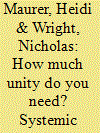| Srl | Item |
| 1 |
ID:
189097


|
|
|
|
|
| Summary/Abstract |
Russia's February 2022 invasion of Ukraine has upended Europe's security order, with many observers calling it a turning point for the European Union. This article contends, however, that the EU's response has been less a turning point and more of an epiphany, providing a reality check for the EU and its member states about how far European foreign policy cooperation has evolved in recent decades. It suggests that an understanding of the EU's response to Russia's invasion of Ukraine requires consideration of the member states' foreign policy co-operation, which has intensified over the past half-century, and its underpinning norm which we term a ‘collective European responsibility to act’. In emphasizing this norm, we identify core ideas about the functioning of collective European foreign policy. We re-examine three key preoccupations of the EU foreign policy-making practice and assessment through the lens of the collective European responsibility to act and show how it enables a different and novel re-reading of the added value of EU foreign policy cooperation. The EU's response to Russia's invasion of Ukraine thus serves as a timely focusing event that demands a rethink of the premises that have underpinned our analysis and understanding of collective European foreign policy-making over decades.
|
|
|
|
|
|
|
|
|
|
|
|
|
|
|
|
| 2 |
ID:
180560


|
|
|
|
|
| Summary/Abstract |
The Common Foreign & Security Policy (CFSP) is a transnational policy framework to deliver collective foreign policy and also to manage differences among member states. As such, it has always been dependent on their support. Since 2019, however, disagreement within this system is said to have reached a new level. Taking this political trend as our starting point, this article proposes a new, conceptual approach to understanding how contestation challenges the EU’s foreign policy cooperation system. While the majority of research focuses on disagreements in decision-making, we argue for a broader conceptualisation – systemic contestation. Drawing on norm contestation scholarship, we argue that systemic contestation manifests itself in two ways: as passive contestation, when member states disengage from and fail to take ownership of CFSP initiatives and their implementation; and as tacit contestation, when they fail to act when faced with the need to safeguard the system. This approach accounts for the transgovernmental character of the CFSP; and the central role of member states within it. Finally, we contend that our conceptualisation of systemic contestation offers promising new avenues for empirical research to understand the “black box” of EU foreign policy cooperation.
|
|
|
|
|
|
|
|
|
|
|
|
|
|
|
|